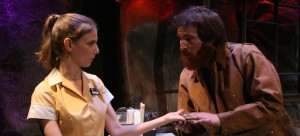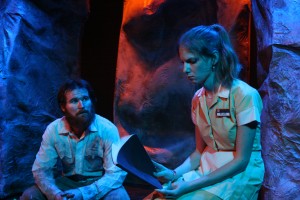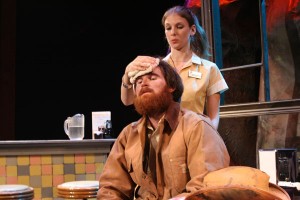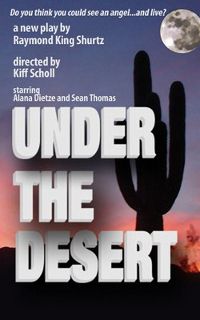A MOUTHFUL OF SAND
Kiff Scholl’s production of Raymond King Shurtz’s new play, Under the Desert, is a show that’s impossible to discuss without equivocation. It’s not terrible, and there are good things in it, but I’m not happy I saw it.
When one sets a two-character play in a greasy spoon in the desert, one begs comparison to other two-character plays, and to other plays set in bars, coffee shops, roadside inns, and deserts. One sets awhirl the minds of audience members who wonder why the American playwright doesn’t set more of his stories on airplanes, or under the sea. Cafes are almost as common a play setting as living rooms, and yet these are only two of what must be at least three or four other potential locales on the face of the Earth. And is the play of two lonely souls who meet, kismet-bound, one wearing a waitress’s apron and the other scruffy from the road, each of them ripe to spill into monologues of metaphysical eloquence… is such a play one that really screams to be written, at this late date?
 If so: if it’s imperative that such a show exist: must it include the trope of a person wearing a nametag gasping, “How do you know my name?” How many bad movies and episodes of television must feature this banality before playwrights, whom we hold to a higher standard (or do we not?) desist from its use? And then there’s that other crutch Mr. Shurtz uses numerous times in this play:
If so: if it’s imperative that such a show exist: must it include the trope of a person wearing a nametag gasping, “How do you know my name?” How many bad movies and episodes of television must feature this banality before playwrights, whom we hold to a higher standard (or do we not?) desist from its use? And then there’s that other crutch Mr. Shurtz uses numerous times in this play:
Ellie: “Stop calling me Ellie.”
Tom: “Ellie is your name, isn’t it?”
Ellie’s line is fine; it’s annoying to have someone repeat your name as often as Tom does hers. But her line leads logically to his, and so here are a few reasons that it’s a stupid exchange to include in this play:
- It’s been in too many other plays.
- A central premise of this story is that Tom knows who Ellie is.
- Just in case he doesn’t: she’s still wearing the nametag.
- If this is just an instance of Tom being sarcastic, it’s the single such instance in a play full of his extremely earnest speech.
- They already had the exchange in which he pointed out her nametag the first time.
Writers ought to recognize at #1 that there’s no necessity to travel to #2. #1 is plenty. But, assuming Mr. Shurtz’s ignorance of the cliché, #2 should have stopped him.
Well, it didn’t, and here we are.
 As Tom, the drifter with a secret past and a Jesus complex (yep), Sean Thomas is entirely more interesting than his character is written. He has chosen to play his spaced-out, potentially murderous, self-anointed priest as a gently condescending creep, a decision that works except for one factor: anyone this creepy would have scared Alana Dietze’s Ellie into arming herself long before the play affords that she actually does. As Ellie, Ms. Dietze is less in line with the show’s overall mood. Her mannered, almost expressionist characterization never quite meshes with Mr. Thomas’s, nor with Mr. Scholl’s direction. In last year’s God’s Ear, her performance fit perfectly into the theatricality of that production, and this script for Under the Desert, grandstanding and unlikely as its story is, could have benefited from a similarly non-realistic presentation. So ultimately, it is Ms. Dietze who had the right feel for this text.
As Tom, the drifter with a secret past and a Jesus complex (yep), Sean Thomas is entirely more interesting than his character is written. He has chosen to play his spaced-out, potentially murderous, self-anointed priest as a gently condescending creep, a decision that works except for one factor: anyone this creepy would have scared Alana Dietze’s Ellie into arming herself long before the play affords that she actually does. As Ellie, Ms. Dietze is less in line with the show’s overall mood. Her mannered, almost expressionist characterization never quite meshes with Mr. Thomas’s, nor with Mr. Scholl’s direction. In last year’s God’s Ear, her performance fit perfectly into the theatricality of that production, and this script for Under the Desert, grandstanding and unlikely as its story is, could have benefited from a similarly non-realistic presentation. So ultimately, it is Ms. Dietze who had the right feel for this text.
 Mr. Scholl, in his straightforward treatment of this heightened play, has highlighted some of its illogic. Were this story presented with the lyricism afforded a poem or song, its flights of unbelievability would matter less; its characters’ behavior would seem less absurd. The set, by Joel Daavid and Marine Walton, leans a little bit in that fantastical direction, but this gesture is undercut by the director. As it stands, a woman who should look a lot more lonely and desperate in order to do the things she does (things that would spoil the story if revealed here) does them anyway. More or less as a result, though too late to be of dramatic value, revelations are made. And underwritten though it is, the script gives two good actors an excuse to play.
Mr. Scholl, in his straightforward treatment of this heightened play, has highlighted some of its illogic. Were this story presented with the lyricism afforded a poem or song, its flights of unbelievability would matter less; its characters’ behavior would seem less absurd. The set, by Joel Daavid and Marine Walton, leans a little bit in that fantastical direction, but this gesture is undercut by the director. As it stands, a woman who should look a lot more lonely and desperate in order to do the things she does (things that would spoil the story if revealed here) does them anyway. More or less as a result, though too late to be of dramatic value, revelations are made. And underwritten though it is, the script gives two good actors an excuse to play.
photos by Matthew Richter
Under the Desert
produced by Sean Thomas and Rodney Patterson at the Lounge Theatre in Hollywood (Los Angeles Theater)
scheduled to end on September 30, 2012
for tickets, visit www.plays411.com/underthedesert.com
